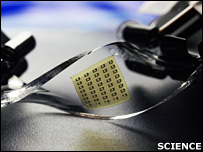 In addition to searching for the ‘God’ particle that is the Higgs, CERN have been making a vast ‘supergrid’ to transfer the vast volumes of data created by the LHC supercollider every second to the universities studying it around the world (currently including myself). The sheer amount of data at the LHC – around 15 Petabytes a year – means a whole new system has been made to spread it to other institutions outside of the collider in Switzerland.
In addition to searching for the ‘God’ particle that is the Higgs, CERN have been making a vast ‘supergrid’ to transfer the vast volumes of data created by the LHC supercollider every second to the universities studying it around the world (currently including myself). The sheer amount of data at the LHC – around 15 Petabytes a year – means a whole new system has been made to spread it to other institutions outside of the collider in Switzerland.
The grid still has some issues to work out but is showing signs of real potential to blow the current internet out of commission in a few years. The grid uses fibre-optic connections and high speed routers to transfer data. It could be as much as 10,000 times as fast as current broadband, allowing movie-sized files to transfer in seconds. Of course, this technology is currently only in use in the world of High Energy Particle Physics but, like the World Wide Web before it, what is invented at CERN tends to propagate out to the rest of us before too long.



